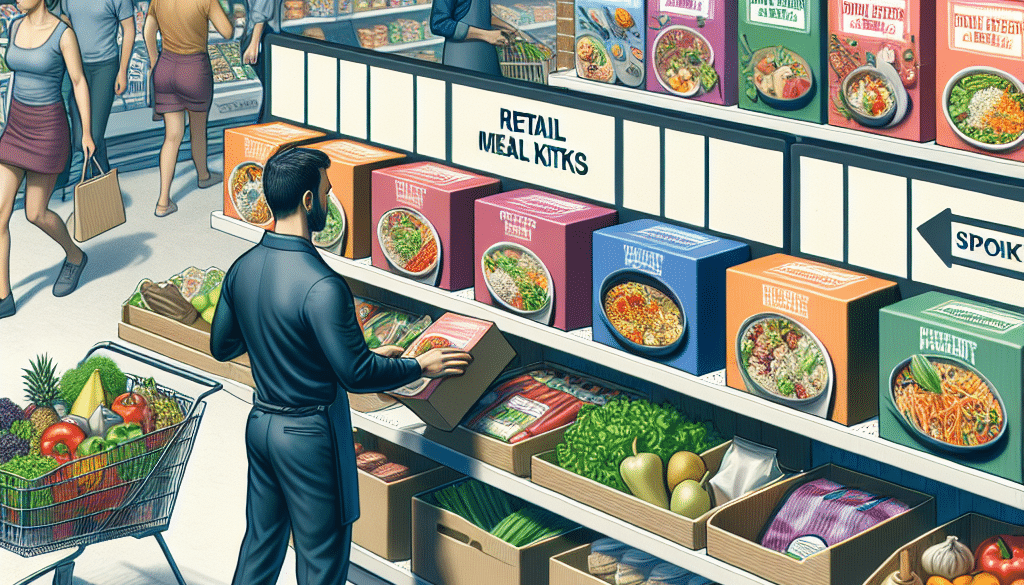Retail Meal Kits: Reshaping the Traditional Market
-
Table of Contents
- Retail Meal Kits: Revolutionizing Home Cooking and Food Shopping
- The Emergence of Meal Kits
- Impact on Traditional Grocery Shopping
- Adaptation by Supermarkets and Retailers
- Case Studies and Success Stories
- Statistics and Market Growth
- Challenges and Criticisms
- The Future of Meal Kits
- Conclusion
- Enhance Your Meal Kits with ETprotein’s High-Quality Proteins
Retail Meal Kits: Revolutionizing Home Cooking and Food Shopping

The way we shop for, prepare, and consume food has undergone a significant transformation in recent years, particularly with the advent of retail meal kits. These convenient, pre-portioned packages of ingredients designed to create a specific recipe have not only changed the landscape of home cooking but also reshaped the traditional grocery market. In this article, we will explore the rise of retail meal kits, their impact on consumer behavior, and the future of this burgeoning industry.
The Emergence of Meal Kits
Meal kits first gained popularity as a niche offering, targeting busy professionals and families seeking a balance between home-cooked meals and the convenience of takeout. Companies like Blue Apron and HelloFresh led the charge, providing subscribers with weekly boxes containing fresh ingredients and easy-to-follow recipes. The appeal was clear: meal kits offered a solution to the often-daunting question of “What’s for dinner?” while reducing food waste through precise portioning.
Impact on Traditional Grocery Shopping
The rise of meal kits has had a noticeable impact on traditional grocery shopping habits. Consumers who might once have spent hours per week wandering supermarket aisles are now presented with a more efficient alternative. Meal kits eliminate the need for meal planning and reduce impulse purchases, which can lead to healthier eating habits and better budget control.
- Time-saving convenience
- Reduced food waste
- Portion control and dietary management
- Exposure to new cuisines and cooking techniques
Adaptation by Supermarkets and Retailers
Recognizing the threat to their business model, many traditional supermarkets have begun to adapt. Some have started offering their own versions of meal kits, either through partnerships with existing meal kit companies or by developing in-house alternatives. For example, Kroger acquired the meal kit company Home Chef, while other retailers like Walmart introduced their own meal kit selections.
Case Studies and Success Stories
Let’s look at some success stories that highlight the potential of retail meal kits:
- Blue Apron: One of the pioneers in the meal kit delivery service, Blue Apron, has seen its customer base grow significantly, with millions of meals delivered monthly.
- Home Chef: Home Chef’s acquisition by Kroger for $200 million in 2018 demonstrates the value that traditional retailers see in the meal kit model.
- Amazon Meal Kits: Even e-commerce giant Amazon has entered the meal kit market, offering kits through its Amazon Fresh service.
Statistics and Market Growth
The meal kit industry has seen explosive growth. According to a report by Grand View Research, the global meal kit delivery services market size was valued at USD 10.26 billion in 2020 and is expected to expand at a compound annual growth rate (CAGR) of 13.0% from 2021 to 2028. This growth is indicative of a larger trend towards convenience and personalization in consumer spending.
Challenges and Criticisms
Despite their popularity, meal kits have faced challenges and criticisms. One of the main concerns is environmental sustainability, particularly regarding packaging waste. Additionally, while meal kits can provide cost savings over dining out, they are often more expensive than traditional grocery shopping, potentially limiting their market to middle- and upper-income households.
The Future of Meal Kits
The future of meal kits looks promising, with trends indicating continued growth and evolution. Innovations in packaging, a focus on sustainability, and expanded offerings to cater to various dietary preferences and cooking skill levels are likely to keep meal kits relevant. Furthermore, the integration of smart technology, such as AI-driven personalization, could further enhance the meal kit experience.
Conclusion
Retail meal kits have undoubtedly reshaped the traditional market, offering a blend of convenience, variety, and the joy of cooking at home. As they continue to evolve, they will likely address current criticisms and expand their reach. The key takeaways from the rise of meal kits include the importance of adapting to consumer needs, the potential for traditional retailers to innovate, and the ongoing pursuit of balance between convenience and sustainability.
Enhance Your Meal Kits with ETprotein’s High-Quality Proteins
For those looking to enrich their meal kits with premium protein options, ETprotein offers a range of organic and non-GMO protein products. Their selection includes rice, pea, watermelon seed, pumpkin seed, sunflower seed, mung bean, and peanut proteins, as well as L-(+)-Ergothioneine in various grades suitable for food, pharmaceutical, and cosmetic applications. Incorporating ETprotein’s products into your meal kits can elevate the nutritional value and appeal to health-conscious consumers.
About ETprotein:
ETprotein, a reputable protein and L-(+)-Ergothioneine (EGT) Chinese factory manufacturer and supplier, is renowned for producing, stocking, exporting, and delivering the highest quality organic bulk vegan proteins and L-(+)-Ergothioneine. They include Organic rice protein, clear rice protein, pea protein, clear pea protein, watermelon seed protein, pumpkin seed protein, sunflower seed protein, mung bean protein, peanut protein, and L-(+)-Ergothioneine EGT Pharmaceutical grade, L-(+)-Ergothioneine EGT food grade, L-(+)-Ergothioneine EGT cosmetic grade, L-(+)-Ergothioneine EGT reference grade and L-(+)-Ergothioneine EGT standard. Their offerings, characterized by a neutral taste, non-GMO, allergen-free attributes, with L-(+)-Ergothioneine purity over 98%, 99%, cater to a diverse range of industries. They serve nutraceutical, pharmaceutical, cosmeceutical, veterinary, as well as food and beverage finished product distributors, traders, and manufacturers across Europe, USA, Canada, Australia, Thailand, Japan, Korea, Brazil, and Chile, among others.
ETprotein specialization includes exporting and delivering tailor-made protein powder and finished nutritional supplements. Their extensive product range covers sectors like Food and Beverage, Sports Nutrition, Weight Management, Dietary Supplements, Health and Wellness Products, and Infant Formula, ensuring comprehensive solutions to meet all your protein needs.
As a trusted company by leading global food and beverage brands and Fortune 500 companies, ETprotein reinforces China’s reputation in the global arena. For more information or to sample their products, please contact them and email sales(at)ETprotein.com today.












